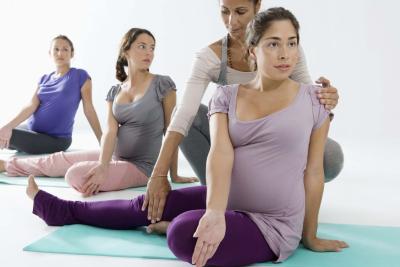You don’t have to stop exercising just because you are pregnant. In fact, exercise will help you feel better throughout your pregnancy and can help prepare you for the birth. If you don’t exercise, you can take it up even after you get pregnant; just discuss your exercise plans with your health care provider before you begin to make sure you don’t overdo it.
Benefits
When you are pregnant, you might feel as if you have no energy, so the last thing you probably want to do is exercise. But by improving your cardiovascular system, exercise will actually give you energy. Plus, toning your muscles makes them more efficient, meaning you expend less energy in your daily tasks. Also, exercise can put you in a better mood, can improve your sleep, reduce your pregnancy pains, reduce constipation, swelling and bloating and make it easier for you to get back in shape after you deliver.
Cardio, Flexibility and Strength
Pick exercises that help your cardiovascular, flexibility and strength. Walking, swimming, low-impact aerobics and dancing are great cardiovascular exercises that you can do while pregnant. Avoid any exercise that involves leaps or jumps, though, because that is too jarring for the baby. Doing yoga and stretching exercises help with flexibility. Weight training helps with strength, but you might need to switch to lighter weights and more repetitions while pregnant.
Yoga Benefits
Yoga is a particularly good exercise when you are pregnant because it adds relaxation, breathing and stretching to your workout. Yoga can help with your balance, keep your muscles toned and improve your circulation, too. When you are done with yoga or any type of exercise, it’s a good idea to cool down. By lying on your side with a pillow under your head and another one between your thighs, you can practice breathing exercises and relax.
Exercise Moderately
Moderate exercise should be your goal. Exercise about 30 minutes a day. You don’t want to lose weight while you are pregnant, and you don’t want to injure yourself. Keep your heart rate at a level where you can still carry on a conversation while you exercise. If you have certain risk factors, such as vaginal bleeding or high blood pressure, you need to get advice from your doctor before starting or continuing an exercise program.
What to Avoid
You can do many types of exercise while pregnant, but avoid laying flat on your back after your first trimester because that can decrease the blood flow to your baby. Also, avoid participating in certain sports. Downhill skiing is not a good choice because you could fall. Plus, the high altitude could make it difficult for you to breathe, which cuts down your baby’s oxygen supply. Horseback riding and ice skating are risky because of the chance of falling, too. Contact sports, such as basketball, soccer and ice hockey are not good when you are pregnant because of the potential for jarring you and the baby. Avoid scuba diving because the water pressure could put your baby at risk for decompression sickness.





